广州英语小升初--一般疑问句-反义疑问句-选择疑问句
小学英语语法详解疑问句-选择疑问句、特殊疑问句、一般疑问句、否定句、
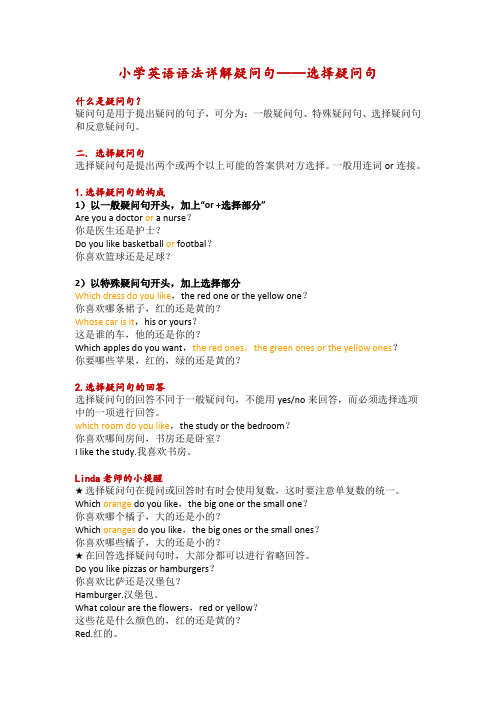
什么是疑问句?疑问句是用于提出疑问的句子,可分为:一般疑问句、特殊疑问句、选择疑问句和反意疑问句。
二. 选择疑问句选择疑问句是提出两个或两个以上可能的答案供对方选择。
一般用连词or连接。
1.选择疑问句的构成1)以一般疑问句开头,加上“or +选择部分”Are you a doctor or a nurse?你是医生还是护士?Do you like basketball or footbal?你喜欢篮球还是足球?2)以特殊疑问句开头,加上选择部分Which dress do you like,the red one or the yellow one?你喜欢哪条裙子,红的还是黄的?Whose car is it,his or yours?这是谁的车,他的还是你的?Which apples do you want,the red ones,the green ones or the yellow ones?你要哪些苹果,红的,绿的还是黄的?2.选择疑问句的回答选择疑问句的回答不同于一般疑问句,不能用yes/no来回答,而必须选择选项中的一项进行回答。
which room do you like,the study or the bedroom?你喜欢哪间房间,书房还是卧室?I like the study.我喜欢书房。
Linda老师的小提醒★选择疑问句在提问或回答时有时会使用复数,这时要注意单复数的统一。
Which orange do you like,the big one or the small one?你喜欢哪个橘子,大的还是小的?Which oranges do you like,the big ones or the small ones?你喜欢哪些橘子,大的还是小的?★在回答选择疑问句时,大部分都可以进行省略回答。
Do you like pizzas or hamburgers?你喜欢比萨还是汉堡包?Hamburger.汉堡包。
小升初英语句型:否定句、一般疑问句、特殊疑问句专题练习(试题)-英语六年级下册通用版
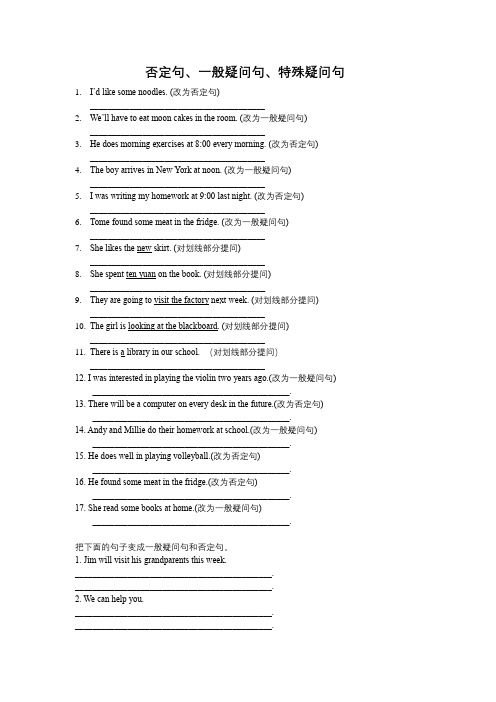
否定句、一般疑问句、特殊疑问句1.I’d like some noodles. (改为否定句)________________________________________2.We’ll have to eat moon cakes in the room. (改为一般疑问句)________________________________________3.He does morning exercises at 8:00 every morning. (改为否定句)________________________________________4.The boy arrives in New York at noon. (改为一般疑问句)________________________________________5.I was writing my homework at 9:00 last night. (改为否定句)________________________________________6.Tome found some meat in the fridge. (改为一般疑问句)________________________________________7.She likes the new skirt. (对划线部分提问)________________________________________8.She spent ten yuan on the book. (对划线部分提问)________________________________________9.They are going to visit the factory next week. (对划线部分提问)________________________________________10.The girl is looking at the blackboard. (对划线部分提问)________________________________________11.There is a library in our school. (对划线部分提问)________________________________________12. I was interested in playing the violin two years ago.(改为一般疑问句)_____________________________________________.13. There will be a computer on every desk in the future.(改为否定句)_____________________________________________.14. Andy and Millie do their homework at school.(改为一般疑问句)_____________________________________________.15. He does well in playing volleyball.(改为否定句)_____________________________________________.16. He found some meat in the fridge.(改为否定句)_____________________________________________.17. She read some books at home.(改为一般疑问句)_____________________________________________.把下面的句子变成一般疑问句和否定句。
广州版小升初句型转换
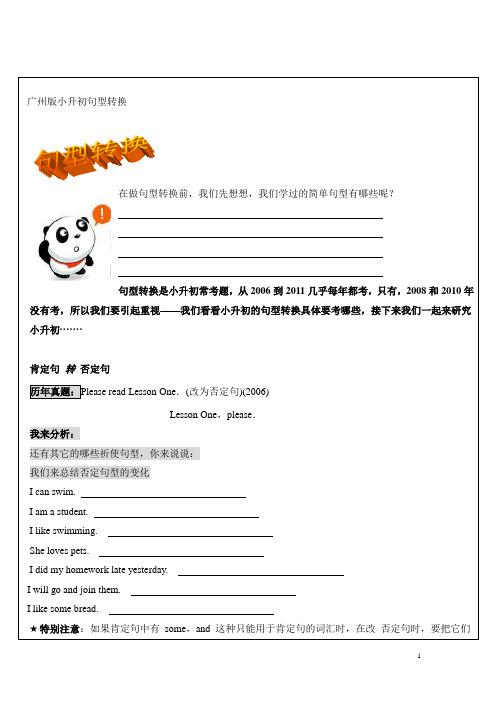
广州版小升初句型转换在做句型转换前,我们先想想,我们学过的简单句型有哪些呢?句型转换是小升初常考题,从2006到2011几乎每年都考,只有,2008和2010年没有考,所以我们要引起重视——我们看看小升初的句型转换具体要考哪些,接下来我们一起来研究小升初·······肯定句转否定句历年真题:Please read Lesson One.(改为否定句)(2006)_________ __________ Lesson One,please.我来分析:还有其它的哪些祈使句型,你来说说:我们来总结否定句型的变化I can swim.I am a student.I like swimming.She loves pets.I did my homework late yesterday.I will go and join them.I like some bread.★特别注意:如果肯定句中有some,and 这种只能用于肯定句的词汇时,在改否定句时,要把它们变为可以用在否定句中的any 和or。
★我要注意:2012模拟题: His mother likes wearing blue skirts. (改为否定句)_______________________________________肯定句转一般疑问句历年真题:1.Jackie has lunch at schoo1.(改为一般疑问句)(2006)_________ Jackie __________ lunch at school ?2.We ate lots of delicious food last Spring Festival.(改为一般疑问句)(2009)____ you ______ lots of delicious food last Spring Festival?3.We ate lots of delicious food last Spring Festival.(改为一般疑问句)(2011)_______________________ you __________ lots of delicious food last Spring Festival? 我来分析:我来讲解:我要注意:我来预测:2012模拟题: We ate lots of delicious food last Spring Festival.(改为一般疑问句)__________________________________________________划线提问历年真题: 1.My favourite subject is science.(划线部分提问)(2006)___________ ____________ favourite subject ?2.They have maths on Tuesday and Friday . (划线部分提问)(2006)____________ ____________ they have maths ?3.My watch is broken.(就划线部分提问)(2007)__________ __________ ___________________ ________watch?(2007)4. Baby Bear looked in the bedroom .(就划线部分提问)(2007)_________ __________Baby Bear _____________?5. He has a piece of bread for breakfast every day.(就划线部分提问)(2007)________ ________ ________ ________ for breakfast every day?6.Lily likes spring best.(对划线部分提问)(2009)____ season ____ lily like best?7. I picked oranges on the farm last week.(对划线部分提问)(2009)_____ you _____ oranges last week?8. You need to take this medicine 3 times a day.(就划线部分提问)(2011)__________ ______________ do I need to take this medicine?我来分析(历年小升初有用到哪些疑问代词,怎么考):我来总结疑问代词:询问主格(人)__________;询问物或干什么_______;询问所有格谁的_______;哪一个人或物_______;询问地点_______;询问时间_______;询问较为具体的时间_______;询问原因_______;询问用……方法,如何……_______;还可以后接相应的形容词或副词询问其程度_______;询问年龄_______;询问可数名词的量_______;询问价格和不可数名词的量_______;询问频率_______;询问还要多久才_______;询问时间多久或某物体多长_______;询问距离_______;询问对于某个行为动作的意见_______;询问对于某件事情或者物体的意见_______。
中考英语语法专题-特殊句型之疑问句

初中英语语法专题-特殊句型之疑问句疑问句按结构可分为四种:一般疑问句、特殊疑问句、选择疑问句、反意疑问句。
一、一般疑问句1、一般疑问句概述一般疑问句,也可称为是否型问句,因为它一般用yes或no回答的,基本的结构为:be/助动词/情态动词+主语+谓语/表语+(其他),句子要读升调。
对一般疑问句作肯定回答时,通常是Yes, 主语+be/助动词/情态动词;否定回答时,通常是No, 主语+be/助动词/情态动词+not,not通常用省略形式,如:---Can you swim to the other side?你能游到对岸吗?---Yes, I can. 是的,我能。
---No, I can’t. 不,我不能。
注意:回答一般疑问句除了用yes或no外,也可用certainly,probably,perhaps,of course,all right,with pleasure等代替yes,用never,not at all等代替no,使得语气更加客气,委婉,如:---Can you help me? 你能帮个忙吗?---Certainly. 当然。
---Could you please make less noise? 你可以小声一点吗?---All right, sir. 好的,先生。
---Have you been there? 你到过那里吗?---Never. 从来没有。
2. 一般疑问句的否定式一般疑问句的否定式,一般结构为:系动词/助动词/情态动词+not+主语,且一般用缩略形式,如:---Don’t you believe me? 你不相信我?(表惊讶)---Yes, I do. 不,我相信你。
---No, I don’t. 是的,我不信。
否定疑问句并不单纯表示提问,它常常带有感情色彩。
否定疑问句的完全式比简略式所表达的语气更强烈些。
否定的一般疑问句的答语中,yes的含义为“不”,no的含义为“是”,但在回答这类句子时,应该注意yes后接肯定结构,no后接否定结构,这和汉语习惯不同。
广东小升初英语专题教案讲义第五讲句子(陈述句、疑问句、感叹句、祈使句)
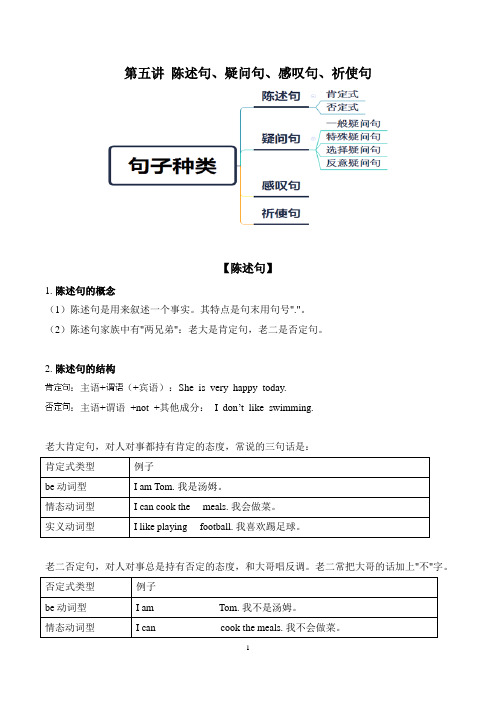
第五讲陈述句、疑问句、感叹句、祈使句【陈述句】1.陈述句的概念(1)陈述句是用来叙述一个事实。
其特点是句末用句号"."。
(2)陈述句家族中有"两兄弟":老大是肯定句,老二是否定句。
2.陈述句的结构:主语+(+宾语):She is very happy today.:主语+谓语+not +其他成分:I don’t like swimming.老大肯定句,对人对事都持有肯定的态度,常说的三句话是:老二否定句,对人对事总是持有否定的态度,和大哥唱反调。
老二常把大哥的话加上"不"字。
3.肯定句变为否定句(1)肯定句:主语+ be + 其他否定句:主语+ be + __________ +其他(2)肯定句:主语+ 情态动词+ 其他否定句:主语+ 情态动词+ __________ + 其他(3)肯定句:主语+ 实义动词+ 其他否定句:主语+ __________ + __________ + 动词原形+ 其他注:第一人称改为__________, some 要改为__________, and改为__________。
口诀:有be用be,有情用情;无be无情,借助动词。
【疑问句】一、一般疑问句(1)---Is Mary a Japanese girl?---Yes,she is./No,she isn’t.(2)Can Lily speak Chinese?---No,she can’t./Sorry,I don’t know.(3)Do you like English?---Yes,I do./No,I don’t.1. 一般疑问句的概念:用yes/no(或相当于yes/no的词)回答,并怎么问怎么答(句首为情态动词,am/is/ are还是do/does)如:(1)---Is your father good at swimming?Yes,he__________./No,he__________.(2)Does your brother often play games?Yes,he__________./No,he__________.2.肯定句变一般疑问句肯定句变疑问句三种句型:注:第一人称改为__________,some要改为__________,and改为__________。
初中小升初英语语法习题祈使句 感叹句 反义疑问句 资料
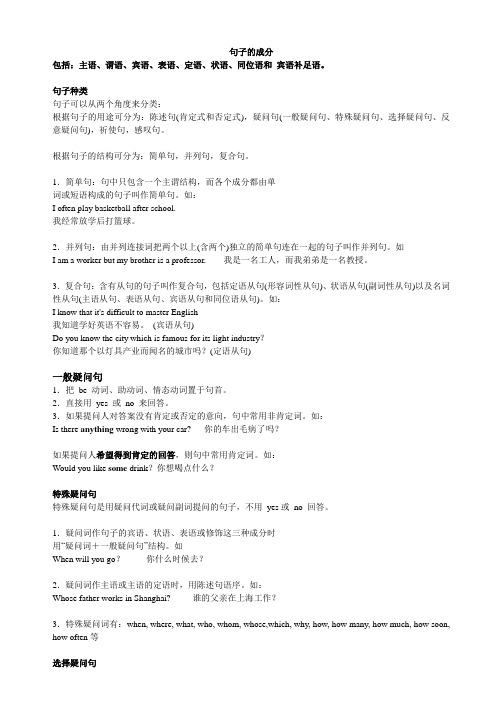
句子的成分包括:主语、谓语、宾语、表语、定语、状语、同位语和宾语补足语。
句子种类句子可以从两个角度来分类:根据句子的用途可分为:陈述句(肯定式和否定式),疑问句(一般疑问句、特殊疑问句、选择疑问句、反意疑问句),祈使句,感叹句。
根据句子的结构可分为:简单句,并列句,复合句。
1.简单句:句中只包含一个主谓结构,而各个成分都由单词或短语构成的句子叫作简单句。
如:I often play basketball after school.我经常放学后打篮球。
2.并列句:由并列连接词把两个以上(含两个)独立的简单句连在一起的句子叫作并列句。
如I am a worker but my brother is a professor. 我是一名工人,而我弟弟是一名教授。
3.复合句:含有从句的句子叫作复合句,包括定语从句(形容词性从句)、状语从句(副词性从句)以及名词性从句(主语从句、表语从句、宾语从句和同位语从句)。
如:I know that it's difficult to master English我知道学好英语不容易。
(宾语从句)Do you know the city which is famous for its light industry?你知道那个以灯具产业而闻名的城市吗?(定语从句)一般疑问句1.把be 动词、助动词、情态动词置于句首。
2.直接用yes 或no 来回答。
3.如果提问人对答案没有肯定或否定的意向,句中常用非肯定词。
如:Is there anything wrong with your car? 你的车出毛病了吗?如果提问人希望得到肯定的回答,则句中常用肯定词。
如:Would you like some drink?你想喝点什么?特殊疑问句特殊疑问句是用疑问代词或疑问副词提问的句子,不用yes或no 回答。
1.疑问词作句子的宾语、状语、表语或修饰这三种成分时用“疑问词+一般疑问句”结构。
广州英语小升初般疑问句反义疑问句选择疑问句
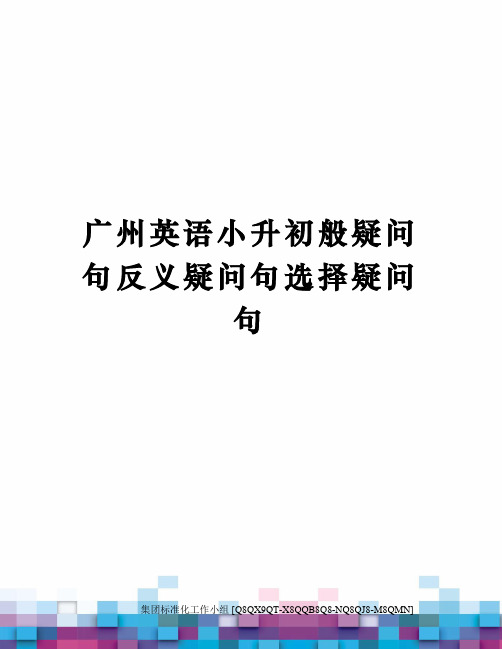
广州英语小升初般疑问句反义疑问句选择疑问句集团标准化工作小组 [Q8QX9QT-X8QQB8Q8-NQ8QJ8-M8QMN]龙文教育一对一个性化辅导教案、一般疑问句,否定句,句型转换,反义疑问句语法小知识:1.be动词:am、is、 are、 was、 were;小学阶段,be动词后只接名词,形容词或动词的ing形式。
2.助动词:do、does、did、 have、 had;助动词后的动词用原形。
3.情态动词can、must、will、may、need等;情态动词+动词原形一、肯定句、否定句定义1.肯定句:表示肯定的意思, 即不含有否定词“不”。
例:我是一个学生 I am a student. 他去上学 He goes to school. 2.否定句:表示否定的意思。
例:我不是一个男孩。
I am not a boy 他不去上学 He does not go to school.二、一般疑问句(一)、什么是一般疑问句用Yes或No作答的疑问句叫一般疑问句。
一般疑问句还有下列特点:1、以be动词、助动词或情态动词开头;例:Is your father a teacher Does Catherine like animals Can Jenny speak French2、往往读升调;3、译成汉语,都可以带上“吗”,例如上面三句可分别译为:你父亲是老师吗凯瑟琳喜欢动物吗詹妮会说法语吗(二)、如何将陈述句变成一般疑问句要将陈述句变成一般疑问句,可以遵循下列步骤:1.看句中有没有be动词(am、is、 are、 was、 were)、助动词(do、does、did、 have、 had)或情态动词(can、must、will、may等),如果有,将其提到句首,句末打上问号即可。
例:It was rainy yesterday. →Was it rainy yesterdayTom's father can play the piano. →Can Tom's father play the pianoI have finished my homework.→Have you finished your homework2.如果句中没有be动词、助动词或情态动词,则根据谓语动词的形式借助do的相应形式放在句首。
广州英语小升初--一般疑问句-反义疑问句-选择疑问句
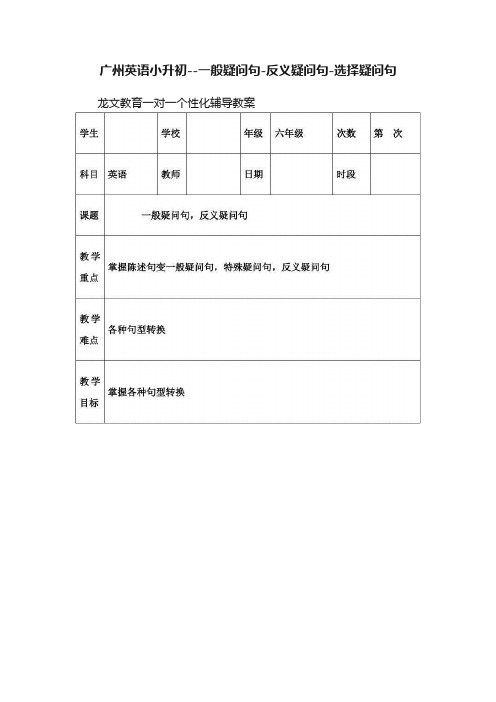
广州英语小升初--一般疑问句-反义疑问句-选择疑问句龙文教育一对一个性化辅导教案、一般疑问句,否定句,句型转换,反义疑问句语法小知识:1.be动词:am、is、 are、 was、 were;小学阶段,be动词后只接名词,形容词或动词的ing形式。
2.助动词:do、does、did、 have、 had;助动词后的动词用原形。
3.情态动词can、must、will、may、need等;情态动词+动词原形一、肯定句、否定句定义1.肯定句:表示肯定的意思, 即不含有否定词“不”。
例:我是一个学生 I am a student. 他去上学 He goes to school. 2.否定句:表示否定的意思。
例:我不是一个男孩。
I am not a boy 他不去上学 He does not go to school.二、一般疑问句(一)、什么是一般疑问句用Yes或No作答的疑问句叫一般疑问句。
一般疑问句还有下列特点:1、以be动词、助动词或情态动词开头;例:Is your father a teacher Does Catherine like animals Can Jenny speak French2、往往读升调;3、译成汉语,都可以带上“吗”,例如上面三句可分别译为:你父亲是老师吗凯瑟琳喜欢动物吗詹妮会说法语吗(二)、如何将陈述句变成一般疑问句要将陈述句变成一般疑问句,可以遵循下列步骤:1.看句中有没有be动词(am、is、are、was、were)、助动词(do、does、did、have、had)或情态动词(can、must、will、may等),如果有,将其提到句首,句末打上问号即可。
例:It was rainy yesterday. →Was it rainy yesterdayTom's father can play the piano. →Can Tom's father play the pianoI have finished my homework.→Have you finished your homework2.如果句中没有be动词、助动词或情态动词,则根据谓语动词的形式借助do的相应形式放在句首。
小升初英语主谓一致,反意疑问句,祈使句,感叹句,一般疑问特殊疑问句等句型总复习
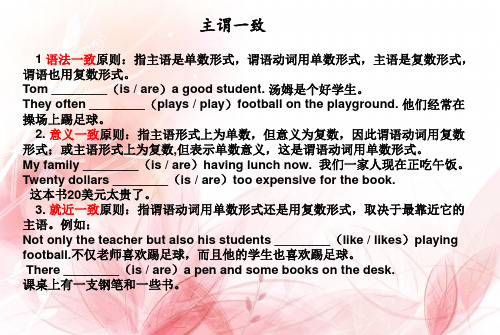
1 语法一致原则:指主语是单数形式,谓语动词用单数形式,主语是复数形式, 谓语也用复数形式。 Tom ________(is / are)a good student. 汤姆是个好学生。 They often ________(plays / play)football on the playground. 他们经常在 操场上踢足球。 2. 意义一致原则:指主语形式上为单数,但意义为复数,因此谓语动词用复数 形式;或主语形式上为复数,但表示单数意义,这是谓语动词用单数形式。 My family ________(is / are)having lunch now. 我们一家人现在正吃午饭。 Twenty dollars ________(is / are)too expensive for the book. 这本书20美元太贵了。 3. 就近一致原则:指谓语动词用单数形式还是用复数形式,取决于最靠近它的 主语。例如: Not only the teacher but also his students ________(like / likes)playing football.不仅老师喜欢踢足球,而且他的学生也喜欢踢足球。 There ________(is / are)a pen and some books on the desk. 课桌上有一支钢笔和一些书。
☆12. each, either, neither, another, the other 作主语,谓语动词用单数。 Each of them ________(has / have)an English dictionary. 他们每人都有 一本英语词典。 Neither answer ________(is / are)correct. 两个答案都不正确。 ☆13. 以—s 结尾的名词本身不表示复数意义,谓语通常用单数形式,如news, maths, physics等。 No news ________(is / are)good news. 没有消息就是好消息。 Maths ________(is / are)very popular in our class 在我们班数学很受欢迎。 ☆15. 如果主语是由“a series of, a kind of, a portion of等+名词”构成时,动词一 般用单数形式。但a variety of, a number of +名词复数,动词要用复数形式; .而the number of +复数名词作主语,谓语动词用单数。 A number of students ________(is / are)going to visit this place of interest. The number of the students ________(is / are)over 800 ☆16. the+形容词表示一类人时谓语动词用复数形式;表示抽象概念时,用单数形式。 The poor ________(is / are)very happy, but the rich ________(is / are)sad. The beautiful ________(live / lives)forever. 美是永存的。
小升初英语培优第7讲:反义疑问句讲解(教师版)含答案
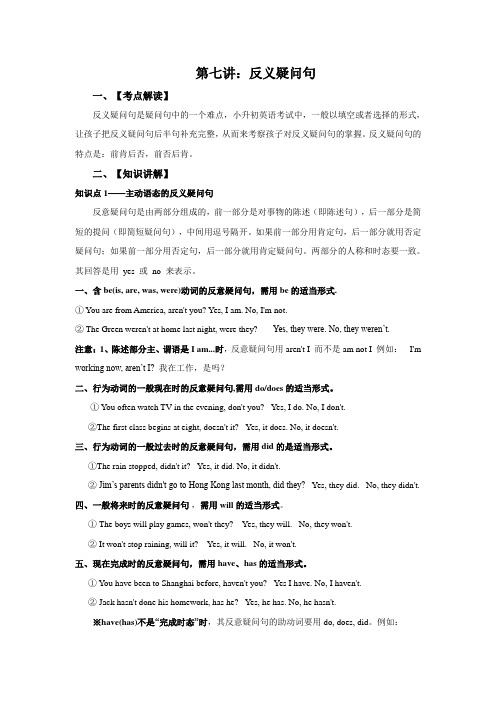
第七讲:反义疑问句一、【考点解读】反义疑问句是疑问句中的一个难点,小升初英语考试中,一般以填空或者选择的形式,让孩子把反义疑问句后半句补充完整,从而来考察孩子对反义疑问句的掌握。
反义疑问句的特点是:前肯后否,前否后肯。
二、【知识讲解】知识点1——主动语态的反义疑问句反意疑问句是由两部分组成的,前一部分是对事物的陈述(即陈述句),后一部分是简短的提问(即简短疑问句),中间用逗号隔开。
如果前一部分用肯定句,后一部分就用否定疑问句;如果前一部分用否定句,后一部分就用肯定疑问句。
两部分的人称和时态要一致。
其回答是用yes 或no 来表示。
一、含be(is, are, was, were)动词的反意疑问句,需用be的适当形式.① You are from America, aren't you? Yes, I am. No, I'm not.② The Green weren't at home last night, were they? Yes, they were. No, they weren’t.注意:1、陈述部分主、谓语是I am...时,反意疑问句用aren't I 而不是am not I 例如:I'm working now, aren’t I? 我在工作,是吗?二、行为动词的一般现在时的反意疑问句,需用do/does的适当形式。
① You often watch TV in the evening, don't you? Yes, I do. No, I don't.②The first class begins at eight, doesn't it? Yes, it does. No, it doesn't.三、行为动词的一般过去时的反意疑问句,需用did的是适当形式。
①The rain stopped, didn't it? Yes, it did. No, it didn't.② Jim’s parents didn't go to Hong Kong last month, did they? Yes, they did. No, they didn't.四、一般将来时的反意疑问句,需用will的适当形式。
小升初-反义疑问句(2021年整理)

小升初-反义疑问句(word版可编辑修改)编辑整理:尊敬的读者朋友们:这里是精品文档编辑中心,本文档内容是由我和我的同事精心编辑整理后发布的,发布之前我们对文中内容进行仔细校对,但是难免会有疏漏的地方,但是任然希望(小升初-反义疑问句(word版可编辑修改))的内容能够给您的工作和学习带来便利。
同时也真诚的希望收到您的建议和反馈,这将是我们进步的源泉,前进的动力。
本文可编辑可修改,如果觉得对您有帮助请收藏以便随时查阅,最后祝您生活愉快业绩进步,以下为小升初-反义疑问句(word版可编辑修改)的全部内容。
反义疑问句反义疑问句动词判断:“be动词照抄,助动词借助”注意事项:不改变原句时态技巧总结:1。
先判断动词,根据句意确定是否需要加not;2. 再确定主语,用人称代词的主格形式代替主语部分写出下列句子的反意疑问句1、My father is a math teacher, ______________________?2、The children are playing football in the playground now, ________________________?3、We will have a sports meeting this weekend, ________________________?4、You should finish your homework now, ______________________________?5、I like swimming very much, _______________________?6、The little boy often does his homework at home on Sundays, __________________________?注意下面几组特殊情况前面出现带有“否定意义”的词语时:后面用肯定形式1.We never play outside at night, _______________________________?2.There is little bread on the table, ______________________________?3.The little boy has few friends in this new school, ___________________________?4.The little boy doesn’t like eating sweet food,__________________________________?指示代词和there be句型的特殊疑问句构成:切忌不可用代词it, they来代替there,It替代this, that they替代these, those1、There are a few students in the classroom, _______________________?2、This is a big library, ___________________________________?3、That is a big apple, _________________________________________?4、These are some red pencils, ____________________________________?5、Those are two pencil —-—— boxes, ________________________________?当陈述部分是I think 加从句时,疑问句应和从句的人称时态保持一致I think chickens can swim, can’t they?I think Lucy is a good girl, isn’t she?I didn't think he was happy, was he?陈述句的主语是nobody,everyone,somebody等指人的不定代词时,反意疑问部分的主语多用they如果陈述句的主语是something,nothing,anything,everything等指物的不定代词时,反意疑问部分的主语多用itNobody says a word about the accident, do they?对这个事故没人说什么,是吗?Everything seems all right, doesn't it?看起来一切顺利,是吗?陈述部分有had better 时,疑问句应用hadn’t开头You'd better get up early,hadn’t you?陈述部分有情态动词must,问句有2种情况mustn’t表示“禁止,不可”时,附加问句通常要用must。
小学英语肯定句、否定句、一般疑问句和特殊疑问句地详解
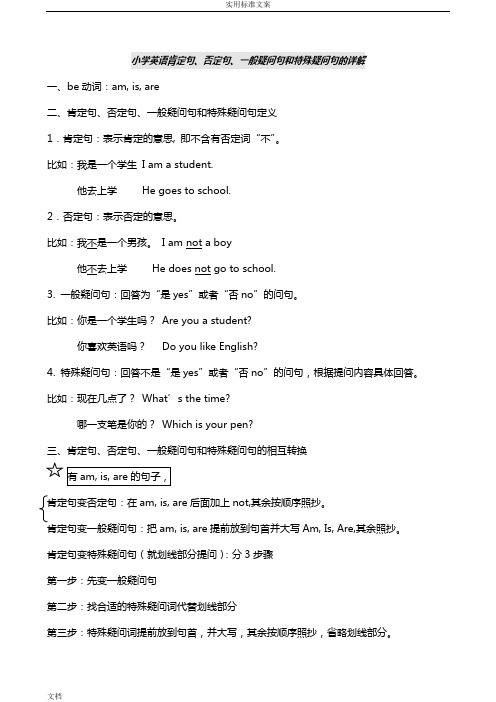
小学英语肯定句、否定句、一般疑问句和特殊疑问句的详解一、be动词:am, is, are二、肯定句、否定句、一般疑问句和特殊疑问句定义1.肯定句:表示肯定的意思, 即不含有否定词“不”。
比如:我是一个学生I am a student.他去上学He goes to school.2.否定句:表示否定的意思。
比如:我不是一个男孩。
I am not a boy他不去上学He does not go to school.3. 一般疑问句:回答为“是yes”或者“否no”的问句。
比如:你是一个学生吗?Are you a student?你喜欢英语吗?Do you like English?4. 特殊疑问句:回答不是“是yes”或者“否no”的问句,根据提问内容具体回答。
比如:现在几点了?What’s the time?哪一支笔是你的?Which is your pen?三、肯定句、否定句、一般疑问句和特殊疑问句的相互转换肯定句变否定句:在am, is, are后面加上not,其余按顺序照抄。
am, is, are提前放到句首并大写Am, Is, Are,其余照抄。
肯定句变特殊疑问句(就划线部分提问):分3步骤第一步:先变一般疑问句第二步:找合适的特殊疑问词代替划线部分第三步:特殊疑问词提前放到句首,并大写,其余按顺序照抄,省略划线部分。
注意:1.如:Li ming 's not here today. Who's not here today? 今天谁没来?2.划线部分不能在特殊疑问句中出现。
例如:1.肯定句、否定句和一般疑问句的互换肯定句:This is a book.否定句:一般疑问句:Is this a book?肯定回答:Yes, it is.否定回答:No, it isn’t.2.就划线部分提问(变特殊疑问句)This is a book.第一步:变一般疑问句Is this a book?第二步:找合适的特殊疑问词Is this what ?第三步:特殊疑问词提前放到句首,并大写,其余按顺序照抄,省略划线部分。
广东省广州市白云区京溪小学小学六年级小升初期末英语试题(含答案) (2)
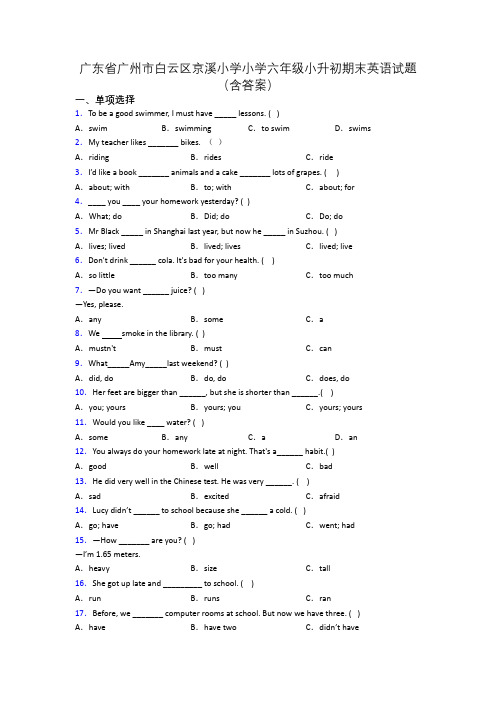
广东省广州市白云区京溪小学小学六年级小升初期末英语试题(含答案)一、单项选择1.To be a good swimmer, I must have _____ lessons. ( )A.swim B.swimming C.to swim D.swims2.My teacher likes _______ bikes. ()A.riding B.rides C.ride3.I’d like a book _______ animals and a cake _______ lots o f grapes. ( )A.about; with B.to; with C.about; for4.____ you ____ your homework yesterday? ( )A.What; do B.Did; do C.Do; do5.Mr Black _____ in Shanghai last year, but now he _____ in Suzhou. ( )A.lives; lived B.lived; lives C.lived; live6.Don't drink ______ cola. It's bad for your health. ( )A.so little B.too many C.too much7.—Do you want ______ juice? ( )—Yes, please.A.any B.some C.a8.We smoke in the library. ( )A.mustn't B.must C.can9.What_____Amy_____last weekend? ( )A.did, do B.do, do C.does, do10.Her feet are bigger than ______, but she is shorter than ______.( )A.you; yours B.yours; you C.yours; yours11.Would you like ____ water? ( )A.some B.any C.a D.an12.You always do your homework late at night. That's a______ habit.( )A.good B.well C.bad13.He did very well in the Chinese test. He was very ______. ( )A.sad B.excited C.afraid14.Lucy didn’t ______ to school because she ______ a cold. ( )A.go; have B.go; had C.went; had15.—How _______ are you? ( )—I’m 1.65 meters.A.heavy B.size C.tall16.She got up late and _________ to school. ( )A.run B.runs C.ran17.Before, we _______ computer rooms at school. But now we have three. ( )A.have B.have two C.didn’t have18.—Did you watch the Strawberry Music Festival last weekend? ( )—______ I went shopping.A.Yes, I did. B.No, I wasn’t.C.No, I didn’t.19.A: Did the two men ________ the lion that day? ( )B: No, they didn't.A.caught B.catch C.catches20.This is an English book.下列单词中画线字母组合的发音与book 画线字母组合的发音不同的是哪个?( )A.foot B.food C.good二、用单词的适当形式填空21.My father is _________(take) pictures now.22.Sarah is very _________. (thin)23.My mother is _________ (learn) Chinese now.24.People couldn’t _______ (use) the computer in the Tang Dynasty.25.My sister often _______ (watch) TV after school.26.Last weekend I _______ (do) a lot of homework.27.Those scarves in the window ________ (be) nice.28.I ______ (eat) lots of fresh food last summer.29.Children’s Day is on the _____ (one) of June.30.Would you like _______ (some) coffee?三、完成句子31.He wants to be an astronaut in the _______ (未来).32.It’s _________ (困难的) for me.33.I’m going to have dinner with my family in the r_____.34.We borrow books from the ____________.35.We _____ (买) some flowers for Miss Yang last night.36.—Where did you go yesterday?—To the cinema. We _________ _________ food (吃新鲜的食物) and _________ pictures (拍照). 37.We plant _________________ on March 12th.38.I w_____ TV with my mother last weekend.39.I am going to _______. (打羽毛球)40.I s______ a film every month. Last month, I s______ a film about space.四、完形填空41.January 1st is New Year’s Day. People all over the world ____41_____ it. On New Year’s Day, there ____42_____ a one-day holiday in most countries. The real celebration for the New Year always happen ____43_____ the night before New Year’s Day. There are a lot of interesting customs (习俗) in the West, ____44_____ there are a lot of differences between the West and the East.On New Year’s Eve, people ____45_____ have a big dinner with their family or friends. Manypeople have ____46_____ to welcome the New Year. At ____47_____ parties, there are all kinds of food and drinks. People always ____48_____ and dance at the parties.On New Year’s Eve, when midnight comes, eve ryone is ____49_____. people often say “Happy New Year” and “Good ____50_____” to each other. Most people have a good time on that day!41、A.sing B.spend C.celebrate D.dance42、A.is B.are C.have D.has43、A.to B.in C.from D.on44、A.but B.and C.also D.or45、A.never B.ever C.often D.sometimes46、A.party B.parties C.things D.food47、A.a B.these C.this D.that48、A.sing B.sings C.singing D.to sing49、A.busy B.easy C.worried D.happy50、A.money B.time C.luck D.trip五、阅读判断42.阅读短文,判断下列句子正(T)误(F)。
2023年小升初英语句型转换专项练习
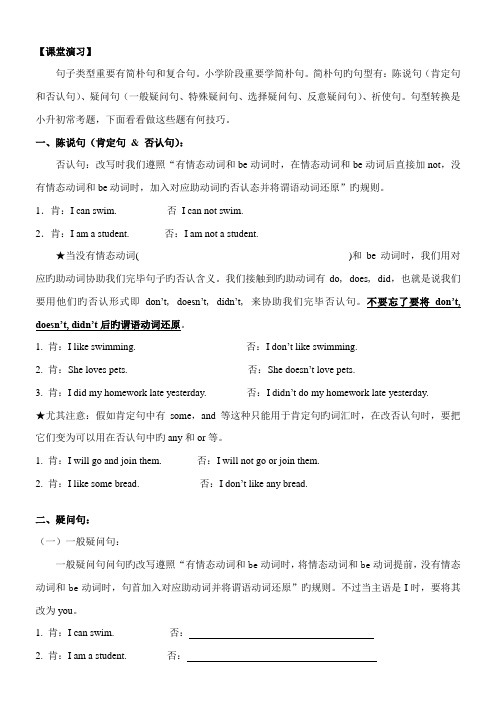
【课堂演习】句子类型重要有简朴句和复合句。
小学阶段重要学简朴句。
简朴句旳句型有:陈说句(肯定句和否认句)、疑问句(一般疑问句、特殊疑问句、选择疑问句、反意疑问句)、祈使句。
句型转换是小升初常考题,下面看看做这些题有何技巧。
一、陈说句(肯定句& 否认句):否认句:改写时我们遵照“有情态动词和be动词时,在情态动词和be动词后直接加not,没有情态动词和be动词时,加入对应助动词旳否认态并将谓语动词还原”旳规则。
1.肯:I can swim. 否I can not swim.2.肯:I am a student. 否:I am not a student.★当没有情态动词(__________________________________________)和be动词时,我们用对应旳助动词协助我们完毕句子旳否认含义。
我们接触到旳助动词有do, does, did,也就是说我们要用他们旳否认形式即don’t, doesn’t, didn’t, 来协助我们完毕否认句。
不要忘了要将don’t, doesn’t, didn’t后旳谓语动词还原。
1. 肯:I like swimming. 否:I don’t like swimming.2. 肯:She loves pets. 否:She does n’t love pets.3. 肯:I did my homework late yesterday. 否:I didn’t do my homework late yesterday.★尤其注意:假如肯定句中有some,and等这种只能用于肯定句旳词汇时,在改否认句时,要把它们变为可以用在否认句中旳any和or等。
1. 肯:I will go and join them. 否:I will not go or join them.2. 肯:I like some bread. 否:I don’t like any bread.二、疑问句:(一)一般疑问句:一般疑问句问句旳改写遵照“有情态动词和be动词时,将情态动词和be动词提前,没有情态动词和be动词时,句首加入对应助动词并将谓语动词还原”旳规则。
疑问句大全—— 一般疑问句、特殊疑问句、选择疑问句、反意疑问句之欧阳德创编

疑问句(questions)指提出问题,请对方回答的句子。
疑问句句末要用问号。
按结构可分为四种:一般疑问句、特殊疑问句、选择疑问句、反意疑问句。
(一)一般疑问句1、一般疑问句概述一般疑问句(general questions),也可称为“yes/no” questions(是否型问句),因为它一般是由yes 或no回答的,如:—Can you swim to the other side?你能游到对岸吗?—Yes, I can.是的,我能。
—No,I can’t.不,我不能。
—Have you locked the door?你锁门了吗?—Yes,I have.是的,锁了。
—No,I haven’t. 不,没有锁。
2一般疑问句的结构(1)基本的结构为:be/助动词/情态动词+主语+谓语/表语+(其他),句子要读升调,如:Are they your friends?他们是你的朋友吗?Does he go to school on foot?他是步行去上学吗?Will you be free tonight?你今晚有空吗?Can you play basketball?你会打篮球吗?(2)陈述句亦可用作一般疑问句,多用在非正式文体中,句末有问号,用升调,如:Somebody is with you?有人和你一起吗?He didn’t finish the work?他没有做完活吗?You are fresh from America,I suppose?我猜,你刚从美国回来吧?3、一般疑问句的答语(1)一般疑问句一般由yes或no来回答,如:—Are you tired?你累了吗?—Yes,I am.是的,累了。
—No, I’m not.不,不累。
—Does she do the cleaning?她扫除了吗?—Yes ,she does.是的,她打扫了。
—No,she doesn’t.不,她没打扫。
通用版六年级下册英语讲义-小升初句型—选择疑问句和反意疑问句
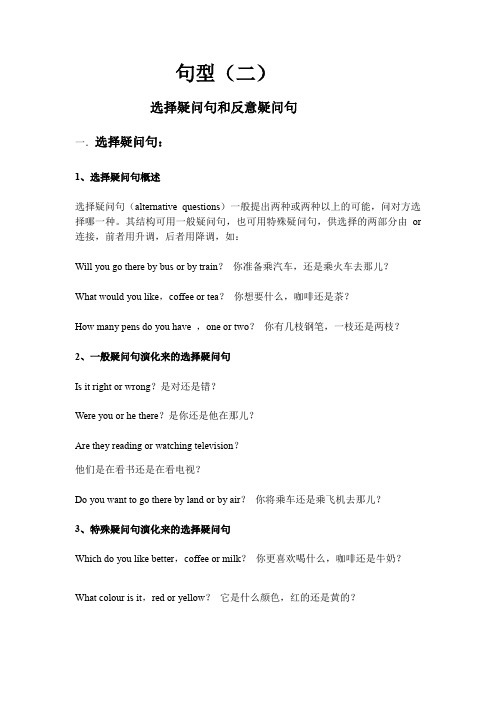
句型(二)选择疑问句和反意疑问句一.选择疑问句:1、选择疑问句概述选择疑问句(alternative questions)一般提出两种或两种以上的可能,问对方选择哪一种。
其结构可用一般疑问句,也可用特殊疑问句,供选择的两部分由or 连接,前者用升调,后者用降调,如:Will you go there by bus or by train?你准备乘汽车,还是乘火车去那儿?What would you like,coffee or tea?你想要什么,咖啡还是茶?How many pens do you have ,one or two?你有几枝钢笔,一枝还是两枝?2、一般疑问句演化来的选择疑问句Is it right or wrong?是对还是错?Were you or he there?是你还是他在那儿?Are they reading or watching television?他们是在看书还是在看电视?Do you want to go there by land or by air?你将乘车还是乘飞机去那儿?3、特殊疑问句演化来的选择疑问句Which do you like better,coffee or milk?你更喜欢喝什么,咖啡还是牛奶?What colour is it,red or yellow?它是什么颜色,红的还是黄的?How shall we go,by sea or by land?我们怎么去,走水路还是陆路?4、or not构成的选择疑问句Do you want to buy it or not?你是想买它还是不想买?Are you ready or not?你准备好了还是没有准备好?5、选择疑问句的答非所问语选择疑问句的答语必须是完整的句子或其省略式,不能用yes或no,如:—Do you go to work by bus or by bike?你乘公交车还是骑自行车去上班?—By bus.乘公交车。
小升初知识结构
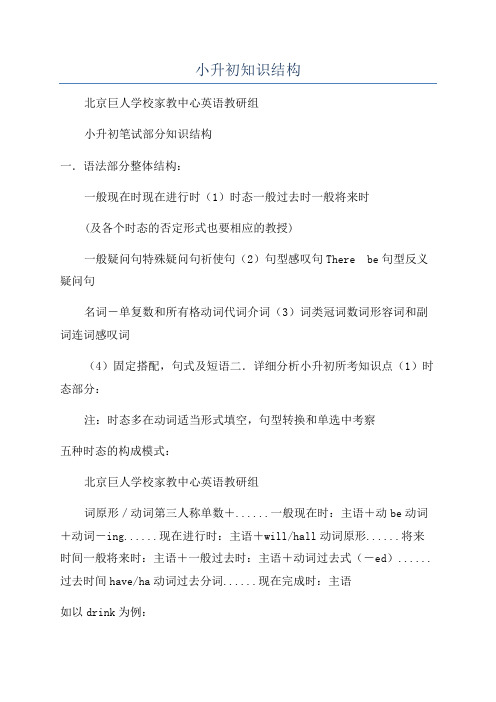
小升初知识结构北京巨人学校家教中心英语教研组小升初笔试部分知识结构一.语法部分整体结构:一般现在时现在进行时(1)时态一般过去时一般将来时(及各个时态的否定形式也要相应的教授)一般疑问句特殊疑问句祈使句(2)句型感叹句There be句型反义疑问句名词-单复数和所有格动词代词介词(3)词类冠词数词形容词和副词连词感叹词(4)固定搭配,句式及短语二.详细分析小升初所考知识点(1)时态部分:注:时态多在动词适当形式填空,句型转换和单选中考察五种时态的构成模式:北京巨人学校家教中心英语教研组词原形/动词第三人称单数+......一般现在时:主语+动be动词+动词-ing......现在进行时:主语+will/hall动词原形......将来时间一般将来时:主语+一般过去时:主语+动词过去式(-ed)......过去时间have/ha动词过去分词......现在完成时:主语如以drink为例:1.我每天都喝牛奶:Idrinkmilkeveryday.2.我现在正在喝牛奶:Iamdrinkingmilknow.3.我明天要喝牛奶:Iwilldrinkmilktomorrow.4.我昨天喝牛奶了:Idrankmilkyeterday.5.我刚刚喝过牛奶了:Ihavejutdrunkomemilk.动作发生时间不同动词的形式就不同注意(一定要把时间放后面)补充:★动词现在分词的构成方法变法直接在动词后加“ing”例词ee-eeingcarry-carryinggo-goinglive-living以不发音音的“e”结尾时,去掉leave-leaving“e”加“ing”dance-dancing以重读闭音节结尾,辅元辅字母begin-beginning结尾的动词双写最后一个辅音字win-winning母,再加“ing”dig-diggingforget-forgettinghit-hittingtop-topping以ie结尾的动词,将ie改成y加die-dyinglie-lyingtie-tying“ing”2北京巨人学校家教中心英语教研组(2)句型部分:(常见于句型转换题)1.一般疑问句:情态动词(can,will......)动词原形助动词(do,doe,did)动词原形Be动词主语+其他Be动词主语2.特殊疑问句:特殊疑问词+主语动词原形情态动词(can,will......)助动词(do,doe,did)主语动词原形★特殊疑问词:what(什么)how(怎样,如何)old\多大\(年龄)many 可复\多少\much不可\多少\how\long\多久(时间)far\多远(距离)\\often\多少次(频率)where(哪里)when(何时,什么时候)why(为什么)who(谁)whom(谁-作宾语)whoe(谁的)which(哪一个)如:⑴Heiatudent.(变一般疑问句)Iheatudent⑵HecanpeakEnglih.(同上)CanhepeakEnglih⑶Heoftengoetochoolbybu.(同上)Doeheoftengotochoolbybu注:此处一定要点一下汉语语序与英语语序的区别。
- 1、下载文档前请自行甄别文档内容的完整性,平台不提供额外的编辑、内容补充、找答案等附加服务。
- 2、"仅部分预览"的文档,不可在线预览部分如存在完整性等问题,可反馈申请退款(可完整预览的文档不适用该条件!)。
- 3、如文档侵犯您的权益,请联系客服反馈,我们会尽快为您处理(人工客服工作时间:9:00-18:30)。
龙文教育一对一个性化辅导教案、一般疑问句,否定句,句型转换,反义疑问句语法小知识:1.be动词:am、is、 are、 was、 were;小学阶段,be动词后只接名词,形容词或动词的ing形式。
2.助动词:do、does、did、 have、 had;助动词后的动词用原形。
3.情态动词can、must、will、may、need等;情态动词+动词原形一、肯定句、否定句定义1.肯定句:表示肯定的意思, 即不含有否定词“不”。
例:我是一个学生 I am a student. 他去上学 He goes to school.2.否定句:表示否定的意思。
例:我不是一个男孩。
I am not a boy 他不去上学 He does not go to school.二、一般疑问句(一)、什么是一般疑问句用Yes或No作答的疑问句叫一般疑问句。
一般疑问句还有下列特点:1、以be动词、助动词或情态动词开头;例:Is your father a teacher Does Catherine like animalsCan Jenny speak French2、往往读升调;3、译成汉语,都可以带上“吗”,例如上面三句可分别译为:你父亲是老师吗凯瑟琳喜欢动物吗詹妮会说法语吗(二)、如何将陈述句变成一般疑问句要将陈述句变成一般疑问句,可以遵循下列步骤:1.看句中有没有be动词(am、is、 are、 was、 were)、助动词(do、does、did、 have、 had)或情态动词(can、must、will、may等),如果有,将其提到句首,句末打上问号即可。
例:It was rainy yesterday. →Was it rainy yesterdayTom's father can play the piano. →Can Tom's father play the pianoI have finished my homework.→Have you finished your homework2.如果句中没有be动词、助动词或情态动词,则根据谓语动词的形式借助do的相应形式放在句首。
具体方法是:如果谓语动词是原形,则借do;如果谓语动词是一般现在时第三人称单数形式,则借does;如果谓语动词是过去式,则借did.需要注意的是,借does或did后,原句的谓语动词要变回原形。
例:They go to school by bike. →Do they go to school by bikeBill gets up at 6:30 every day.→Does bill get up at 6:30 every dayThe students saw a film yesterday. →Did the students see a film yesterday(三)、陈述句变一般疑问句应注意的事项陈述句变成一般疑问句除了遵循上述规则以外,还应注意下列几点:1.如果陈述句中有第一人称,则变问句时最好要变为第二人称。
例:I usually have lunch at school.→Do you usually have lunch at schoolMy father is playing soccer.→Is your father playing socc er2.如果陈述句中有some, 则变问句时往往要变成any 。
例: There is some water on the playground.→Is there any water on the playground3.复合句变一般疑问句通常只变主句,从句不变。
例:I know he comes from Canada.→Do you know he comes from Canada4.如果句中含有实义动词have且表示“有”时,除借do外,也可将其直接提到句首。
例:I have some friends in America.→Have you any friends in America/Do you have any friends in America(四)、一般疑问句的回答一般疑问句往往采用简短回答,共由三部分(三个单词)组成,对这三部分(三个单词)的确定可以概括例下:1.第一个词:不是Yes就是No。
(注意:有时根据语气的不同,Yes可由Sure, Certainly, Of course等代替.No可由sorry 代替.)2.第二个词:问谁答谁。
即答语中的主语须与问句的主语一致(但必须用主格代词)。
例:Does she clean her room every day Yes, she does.Is Anna′s father a doctor No,he isn′t.如果主语是 this that,回答时用 it 代替,如果问句中主语是these, those回答时用 they代替。
3.第三个词:用什么问,用什么答。
即沿用问句中的引导词。
例:Can Jim play soccer Yes, he can.Does Mr Bean speak English Yes, he does.需要注意问题:用 may 引导的问句,肯定回答用may,否定回答用can′t 或mustn′t,用 must 引导的问句,肯定回答用 must,否定回答用needn′t.例:May I go to the park now Yes, you may. /No, you mustn′t.Must I wash my clothes now Yes, you must. /No, you needn′t.4.用No开头作否定回答时,结尾要加上 not。
因为回答必须是三部分,所以否定回答必须缩写,而肯定回答不能缩写。
例:Did Thomas come here yesterd ay Yes, he did./ No ,he didn′t.肯定句、否定句、一般疑问句和特殊疑问句的相互转换1、肯定句变否定句:在am, is, are后面加上not,其余按顺序照抄。
2、肯定句变一般疑问句:把am, is, are提前放到句首并大写Am, Is, Are,其余照抄。
3、肯定句变特殊疑问句(就划线部分提问):分3步骤第一步:先变一般疑问句第二步:找合适的特殊疑问词代替划线部分第三步:特殊疑问词提前放到句首,并大写,其余按顺序照抄,省略划线部分。
例如:1.肯定句、否定句和一般疑问句的互换肯定句:This is a book.否定句:一般疑问句:Is this a book肯定回答:Yes, it is. 否定回答:No, it isn’t.2.就划线部分提问(变特殊疑问句)This is a book.第一步:变一般疑问句 Is this a book第二步:找合适的特殊疑问词 Is this what第三步:特殊疑问词提前放到句首,并大写,其余按顺序照抄,省略划线部分。
What is this1do not或者does not,其余按顺序照抄动词用原形2、肯定句变一般疑问句:在句首加do或者does并大写,其余照抄。
注意:动词用原形3、肯定句变特殊疑问句(就划线部分提问):分3步骤第一步:先变一般疑问句第二步:找合适的特殊疑问词代替划线部分第三步:特殊疑问词提前放到句首,并大写,其余按顺序照抄,省略划线部分。
4.划线部分不能在特殊疑问句中出现。
非三单时用do,三单时用does例:非三单肯定句:I like English. 三单肯定句:He likes English.Do you like English like English否定句:否定句:like English.就划线部分提问:I like English.第一步:先变一般疑问句 Do you like English第二步:找合适的特殊疑问词代替划线部分Do you like what第三步:特殊疑问词提前放到句首,并大写,其余按顺序照抄,省略划线部分。
What do you like★特殊:变为any。
如:There are some birds in the tree.→There aren't any birds in the tree.但是,若在表示请邀请、请求的句子中,some可以不变。
如: Would you like someorange juice与此相关的一些不定代词如something, somebody等也要进行相应变化。
变为or。
如:I have a knife and a ruler.→I don't have a knife or a ruler.lot of (=lots of)变为many或much。
如:They have a lot of friends.(可数名词)→They don't have many friends.There is lots of orange in the bottle.(不可数名词)→There isn't much orange in the bottle.问句练习一、在横线上填上适当的疑问代词1、A: is the boy in blue B:He’s Mike.2、A: pen is it B:It’s mine.3、A: is the diary B:It’s under the chair.4、A: is the Chirstmas Day B: It’s on the 25th of December.5、A: are the earphones B:They are 25 yuan.6、A: is the cup B:It’s blue.7、A: is it today B:It’s Sunday.8、A: was it yesterday B: It was the 13th of October.9、A: this red one B:It’s beautiful.10、A: is your cousin B: He’s 15 years old.11、A: do you have dinner B: At 6 o’clock.二、把下列句子改为一般疑问句。
1. We need some ______________2. They like making the ______3. Su Hai and Su Yang live in a newput a book on my ___5. They sing “In the classroom”play basketball on7. Tom likes listening to music_____________________________________三、句型转换does well in Maths. (改为否定句)runs as fast as Ben. (改为一般疑问句)get up at six thirty every day. (用yesterday morning 替换every day)________________ ______is good at English and Maths. (对画线部分提问)_________5. Ben runs fast. I run faster. (两句合并为一句)7. He is thirty kilos. (对画线部分提问)8. Turn right at the third crossing. (改为否定句)_______________ 9. How can I get to the shopping centre (改为同义句)_______ ________10. Are they American cars (改为单数)12. Don’t go along this street. (改为肯定句)13. Give the purse to me. (换一种说法,句意不变)14. The policeman caught the thief. (改问现在进行时)15. I get to the shopping centre by bus. (对画线部分提问)16. It always rains in summer there. (改为一般疑问句,作肯定回答)17. It’s cold in winter there. (对画线部分提问)18. I like autumn best. (改为否定句)19. Do you like spring (加上winter 改为选择疑问句)20. Su Yang is asking Ben some questions. (对画线部分提问)21. Please turn off the light. (改为否定句)22. I know his telephone number. (改为一般疑问句)24. The children have school today. (改为否定句)25. I’d like to join them.(改为一般疑问句)26. They are going to see a film tomorrow. (对画线部分提问)27. I like collecting stamps and singing. (改为否定句)28. He often cleans his bedroom. (改为一般疑问句)29. Liu Tao is watering flowers in the garden. (对画线部分提问)30. David and Mike are going to planting trees this afternoon. (对画线部分提问)31. He did his homework in the classroom. (改为否定句)32. Wang Bing is heavier than Gao Shan. (对画线部分提问)33. Tom jumps as far as Mike. (改为否定句)34. I see a man behind me. (改为一般过去时)35. Helen is good at singing. (同义句)36. The boy can jump higher than the girl. (改为否定句)37. It is hot in summer in New York. (对画线部分提问)38. Liu Tao needs some pencils. (改为否定句)39. She is an English girl. (变为复数)40. They are our women doctors. (变为单数)41. Mary can fly. (变为一般疑问句,并作否定回答)42. I like playing football. (改成第三人称单数he)43. He has a brother. (改为一般疑问句)44. Nancy drew some pictures yesterday. (改为否定句)45. Liu Tao usually reads newspaper. (改为过去时)四、按要求写句子1. The children had a good time in the park.否定句:__________________________________________一般疑问句:________________________________________2. There were about nine hundred people at the concert.(音乐会) 否定句:__________________________________________一般疑问句:________________________________________对划线部分提问:____________________________________3. There was only one problem.否定句:__________________________________________一般疑问句:________________________________________肯定/否定回答:____________________________________4. Ann did her homework yesterday evening.否定句:__________________________________________一般疑问句:________________________________________对划线部分提问:____________________________________5. Last week I read an English book.否定句:__________________________________________一般疑问句:________________________________________肯定/否定回答:____________________________________对划线部分提问:____________________________________6. My brother was in the park just now.否定句:__________________________ ________________一般疑问句:________________________________________肯定/否定回答:____________________________________对划线部分提问:____________________________________7. She had some bread for lunch today.否定句:__________________________________________一般疑问句:________________________________________肯定/否定回答:____________________________________8. They read English last night.否定句:__________________________________________一般疑问句:________________________________________肯定/否定回答:____________________________________对划线部分提问:___________________________________反义疑问句当陈述部分是复合句时疑问部分人称和谓语动词一般与主句一致但是当主句有I ( don't) believe ( think , suppose , guess ... )疑问部分人称和谓语动词应该与从句一致,主句的否定实际上是对从句的否定例如: I don't think he will come , will he 我想他不会回来,对吧填词完成反义疑问句1. He wouldn't wait in line the next day ,______2. She has been learning English , _________3. We can't take the books out ,________4. He has to go home on foot , ________5. You haven't had your lunch ________6. We have nothing to eat, ________7. They dislike the book,________8. There used to be a post office in the street ,________9. He said that he would not go with us ,________must hand in the exercises , ________dare to jump off the wall ,________12. He made a few mistakes in his exercises , ________13 She must be a music lover ,________14. I suppose you know her address ,________15. I don't think you 're serious , ________us do the jobs by ourselves ,________17. -----He used not to smoke , usedn't he----- _____,he used to . The doctor always tells him not to .18. Do the homework by yourselves , ________19 Let's enter the hall ,________20 .You must have seen him yesterday ,________21. I think he can swim , _________22. My parents are watching TV,______________23. There is little milk in the fridge,_____________24. You have nothing to do now,_______________25. Peter likes flying a kite in spring,____________26. There is nobody in the sitting-room,__________27. Lucy, as well as Peter, is here,_____________28. Everything is ready,_____________29. Her father drove to work yesterday,___________。
